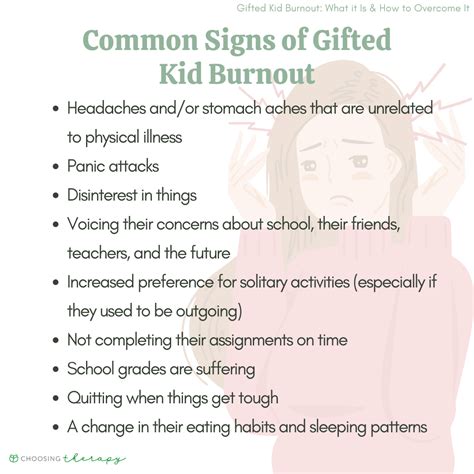
Gifted children, often lauded for their exceptional abilities, frequently face a hidden struggle: burnout. This phenomenon, characterized by exhaustion, cynicism, and a sense of inefficacy, can stem from intense pressure to maintain high achievement, leading to long-term consequences for their mental and emotional well-being.
The pressure to excel, sometimes self-imposed but often fueled by parental or societal expectations, can create a relentless cycle of stress for gifted children. “They’re so worried about disappointing or failing,” explains Dr. Susan Daniels, a professor of educational psychology specializing in gifted education at California State University, San Bernardino, in the original Yahoo Lifestyle article. This fear of failure can lead to anxiety, depression, and ultimately, burnout. The term “gifted kid burnout” is not a new concept, but one gaining increased recognition as parents and educators become more attuned to the unique challenges faced by these students.
The cycle often begins early, with children identified as gifted entering accelerated programs or facing increased academic demands. While these opportunities can be enriching, they also place a significant burden on young individuals who may not possess the emotional maturity to cope with the added pressure. The expectation to consistently perform at a high level can erode intrinsic motivation, replacing it with a focus on external validation and achievement.
One anonymous individual quoted in the original article recounts their experience: “I was enrolled in a gifted program as a kid and for years everyone told me how smart I was and how much potential I had.” This praise, while seemingly positive, created a sense of obligation to constantly live up to these expectations. “By the time I got to college, I was so burnt out that I just stopped trying.” This anecdote illustrates the potential long-term consequences of unchecked pressure on gifted children.
The experience described isn’t uncommon. Gifted children often internalize the belief that their worth is tied to their achievements. This can lead to a fragile sense of self-esteem, making them particularly vulnerable to setbacks and failures. When they inevitably encounter challenges, they may perceive it as a personal failing, further exacerbating feelings of inadequacy and hopelessness.
Furthermore, the social and emotional needs of gifted children are often overlooked. Their intellectual precocity can sometimes mask underlying insecurities and difficulties in social adjustment. They may struggle to connect with peers who do not share their interests or understand their intensity. This social isolation can contribute to feelings of loneliness and alienation, further increasing their risk of burnout.
The challenge for parents and educators lies in fostering a supportive environment that nurtures the talents of gifted children without placing undue pressure on them. This requires a shift in focus from solely emphasizing achievement to prioritizing their overall well-being. Strategies for mitigating burnout include encouraging self-compassion, promoting healthy coping mechanisms, and providing opportunities for social connection and meaningful engagement.
Creating opportunities for exploration and discovery outside of academics is also crucial. Gifted children often have a wide range of interests and talents, and allowing them to pursue these passions can provide a sense of joy and fulfillment that counteracts the pressures of academic performance. Encouraging participation in extracurricular activities, hobbies, and creative pursuits can help them develop a more well-rounded sense of identity and purpose.
Moreover, open communication is essential. Parents and educators should create a safe space for gifted children to express their feelings and concerns without fear of judgment. Actively listening to their experiences and validating their emotions can help them feel understood and supported. Teaching them strategies for managing stress and anxiety, such as mindfulness and relaxation techniques, can also be beneficial.
Addressing the myth that gifted children should effortlessly excel is also important. It is crucial to acknowledge that they, like all individuals, will encounter challenges and setbacks. Framing these experiences as opportunities for growth and learning can help them develop resilience and a more positive attitude towards failure. Emphasizing the importance of effort and perseverance over innate ability can also help to shift their focus from external validation to intrinsic motivation.
The key is to strike a balance between providing opportunities for intellectual stimulation and ensuring their emotional and social needs are met. Gifted children deserve the chance to reach their full potential, but not at the expense of their well-being. By recognizing the signs of burnout and implementing proactive strategies, parents and educators can help them navigate the challenges of giftedness and thrive in all aspects of their lives. Recognizing that perfection is unattainable and that setbacks are a natural part of the learning process is fundamental in preventing burnout. Encouraging a growth mindset, where effort and learning are valued over innate talent, helps children develop resilience and a more positive attitude towards challenges.
The dangers of solely focusing on academic achievement are multifaceted. It can lead to a narrow definition of success, where self-worth is solely tied to grades and test scores. This can create a sense of anxiety and pressure that permeates all aspects of their lives, leaving them feeling constantly stressed and overwhelmed. Moreover, it can stifle creativity and innovation, as they may be less willing to take risks or explore new ideas for fear of failure.
Prioritizing the well-being of gifted children requires a holistic approach that addresses their intellectual, emotional, and social needs. This includes providing opportunities for them to connect with like-minded peers, engage in activities that spark their passions, and develop healthy coping mechanisms for managing stress. It also involves fostering a supportive environment where they feel valued and accepted for who they are, regardless of their academic achievements.
Giftedness is a complex and multifaceted phenomenon. It is not simply about having a high IQ or excelling in academics. It also encompasses creativity, curiosity, and a deep desire to learn. By recognizing and nurturing these qualities, parents and educators can help gifted children develop a lifelong love of learning and a strong sense of purpose.
Ultimately, the goal is to help gifted children become well-rounded individuals who are not only successful in their chosen fields but also happy and fulfilled in their lives. This requires a commitment to supporting their overall well-being and fostering a growth mindset that values effort, perseverance, and a lifelong love of learning. The conversation surrounding “giftedness” also needs to evolve. Instead of focusing solely on innate talent, the emphasis should be on cultivating a love for learning and fostering a growth mindset. This shift in perspective can help to alleviate the pressure on gifted children to constantly perform at a high level and allow them to embrace challenges as opportunities for growth.
The pressure on gifted children doesn’t solely come from external sources. Many gifted children are perfectionists by nature, placing incredibly high standards on themselves. This internal pressure can be just as damaging as external expectations, leading to chronic stress and anxiety. Learning to manage perfectionistic tendencies and embrace self-compassion is crucial for preventing burnout.
Teachers and parents play a pivotal role in shaping the learning environment for gifted children. Educators should be trained to identify and address the unique needs of these students, providing differentiated instruction that challenges them without overwhelming them. Parents should focus on creating a supportive and loving home environment where their children feel safe to explore their interests and express their emotions.
Furthermore, advocating for changes in the educational system is essential. Current standardized testing and grading systems often prioritize rote memorization and conformity over creativity and critical thinking. This can be particularly detrimental to gifted children, who may find these systems stifling and unfulfilling. Promoting alternative assessment methods that value creativity, problem-solving, and independent thinking is crucial for fostering a more engaging and enriching learning experience.
The long-term consequences of gifted kid burnout can be significant, impacting their academic, professional, and personal lives. Burnout can lead to decreased motivation, difficulty concentrating, and a loss of interest in activities that once brought them joy. It can also contribute to mental health problems, such as anxiety, depression, and even suicidal ideation. Addressing the issue of gifted kid burnout is not just about helping children succeed in school; it’s about ensuring their long-term well-being and happiness.
One of the key challenges in addressing gifted kid burnout is the stigma associated with seeking help. Gifted children may feel ashamed or embarrassed to admit that they are struggling, fearing that it will undermine their image as high achievers. Creating a culture of openness and acceptance, where it is okay to ask for help, is essential for encouraging gifted children to seek the support they need.
Therapy and counseling can be incredibly beneficial for gifted children who are experiencing burnout. A therapist can help them identify the underlying causes of their stress and anxiety, develop healthy coping mechanisms, and build resilience. Cognitive-behavioral therapy (CBT) is a particularly effective approach for addressing perfectionistic tendencies and negative thought patterns.
The conversation around gifted kid burnout needs to extend beyond the classroom and into the broader community. Parents, educators, mental health professionals, and policymakers all have a role to play in creating a more supportive and understanding environment for gifted children. By working together, we can help these children thrive and reach their full potential without sacrificing their well-being. The narrative surrounding giftedness needs to shift from an emphasis on innate ability to a focus on fostering a love of learning and cultivating a growth mindset.
Addressing the issue of gifted kid burnout requires a multi-faceted approach that takes into account the individual needs of each child. There is no one-size-fits-all solution. Parents and educators need to be flexible and adaptable, tailoring their support to the specific challenges and strengths of each gifted child. This may involve adjusting academic expectations, providing opportunities for enrichment and exploration, and fostering a supportive and loving environment.
Ultimately, the goal is to help gifted children develop a strong sense of self-worth that is not solely based on their academic achievements. This requires helping them discover their passions, develop their talents, and build meaningful relationships. By fostering a holistic approach to development, we can help gifted children thrive and lead fulfilling lives. Recognizing that intelligence is not a fixed trait but rather a dynamic and evolving capacity is critical. Encouraging a growth mindset, where effort and learning are valued over innate ability, helps children develop resilience and a more positive attitude towards challenges.
The signs of gifted kid burnout can be subtle and easily overlooked. It is important for parents and educators to be vigilant and to pay attention to any changes in a child’s behavior or attitude. Some common signs of burnout include: decreased motivation, fatigue, irritability, difficulty concentrating, social withdrawal, and physical symptoms such as headaches or stomachaches. If you notice any of these signs in a gifted child, it is important to seek professional help.
In addition to therapy and counseling, there are a number of self-help strategies that gifted children can use to manage stress and prevent burnout. These include: practicing mindfulness, engaging in regular exercise, getting enough sleep, eating a healthy diet, and spending time in nature. It is also important to set realistic goals, prioritize tasks, and learn to say no to অতিরিক্ত commitments.
The educational system needs to be reformed to better meet the needs of gifted children. This includes providing differentiated instruction, offering enrichment opportunities, and promoting alternative assessment methods. It also involves creating a more inclusive and supportive learning environment where gifted children feel valued and accepted for who they are. Advocating for these changes is crucial for ensuring that gifted children have the opportunity to thrive and reach their full potential.
The conversation around gifted kid burnout is a complex and nuanced one. There is no easy solution. However, by working together, parents, educators, mental health professionals, and policymakers can create a more supportive and understanding environment for gifted children. This will help them navigate the challenges of giftedness and lead fulfilling lives.
Frequently Asked Questions (FAQs):
1. What is gifted kid burnout?
Gifted kid burnout is a state of emotional, physical, and mental exhaustion experienced by gifted children due to excessive and prolonged stress, often stemming from pressure to maintain high achievement. It’s characterized by feelings of cynicism, detachment, and a sense of inefficacy, leading to decreased motivation and performance. As mentioned in the source material, these kids can feel “worried about disappointing or failing.”
2. What are the common causes of gifted kid burnout?
Several factors contribute to gifted kid burnout. These include:
- Pressure to excel: High expectations from parents, teachers, and themselves can create immense stress.
- Perfectionism: A tendency to set unrealistically high standards and strive for flawless performance.
- Lack of social connection: Difficulty finding peers who share their intellectual interests and understand their intensity.
- Over-scheduling: Participation in numerous extracurricular activities and academic pursuits, leaving little time for rest and relaxation.
- Fear of failure: Anxiety about not meeting expectations or living up to their perceived potential.
- Focus on external validation: Self-worth tied to achievements and recognition from others.
3. What are the signs and symptoms of gifted kid burnout?
Identifying burnout early is crucial for intervention. Common signs include:
- Decreased motivation: Loss of interest in activities they once enjoyed.
- Fatigue and exhaustion: Feeling constantly tired, even after adequate rest.
- Irritability and mood swings: Becoming easily frustrated and experiencing emotional outbursts.
- Difficulty concentrating: Trouble focusing on tasks and completing assignments.
- Social withdrawal: Avoiding social interactions and isolating themselves from friends and family.
- Physical symptoms: Headaches, stomachaches, and other stress-related ailments.
- Cynicism and negativity: Developing a pessimistic outlook and expressing negative feelings about school or other activities.
- Procrastination: Delaying or avoiding tasks, even those they previously found enjoyable.
- Decline in academic performance: Grades slipping despite their usual high achievement.
- Increased anxiety or depression: Experiencing heightened levels of worry or sadness.
4. How can parents and educators help prevent gifted kid burnout?
Parents and educators play a critical role in supporting the well-being of gifted children. Strategies for prevention include:
- Promoting a growth mindset: Emphasizing effort, learning, and perseverance over innate ability.
- Encouraging self-compassion: Helping children to be kind and understanding towards themselves, especially when they make mistakes.
- Providing opportunities for exploration and discovery: Allowing them to pursue their interests and passions outside of academics.
- Fostering social connections: Facilitating opportunities for them to connect with like-minded peers.
- Teaching healthy coping mechanisms: Equipping them with strategies for managing stress and anxiety, such as mindfulness and relaxation techniques.
- Setting realistic expectations: Avoiding placing undue pressure on them to achieve perfection.
- Prioritizing their overall well-being: Ensuring they get enough sleep, eat a healthy diet, and engage in regular exercise.
- Creating a safe space for communication: Encouraging them to express their feelings and concerns without fear of judgment.
- Celebrating effort and progress: Focusing on their growth and development rather than solely on their achievements.
- Supporting their individual needs: Recognizing that each gifted child is unique and requires personalized support.
5. What resources are available for gifted children experiencing burnout?
Several resources can provide support and guidance for gifted children and their families:
- Therapists and counselors: Mental health professionals specializing in giftedness can help children identify the underlying causes of their burnout and develop healthy coping mechanisms. Cognitive behavioral therapy (CBT) can be especially helpful.
- Gifted education organizations: Organizations such as the National Association for Gifted Children (NAGC) and Supporting Emotional Needs of the Gifted (SENG) offer resources, information, and support for gifted children and their families.
- School counselors and psychologists: School-based professionals can provide individual counseling and support, as well as connect families with external resources.
- Books and articles: Numerous publications offer insights and strategies for understanding and addressing gifted kid burnout.
- Online communities: Online forums and support groups can provide a sense of connection and shared experience for gifted children and their families.
- Parenting classes and workshops: Educational programs can help parents learn effective strategies for supporting their gifted children’s well-being.
- Mentorship programs: Connecting gifted children with mentors who can provide guidance and support.
- Educational consultants: Consultants specializing in gifted education can provide individualized assessments and recommendations for academic and social-emotional support.
The key is to be proactive and seek help early if you suspect a gifted child is experiencing burnout. With the right support, these children can overcome the challenges they face and thrive in all aspects of their lives.









